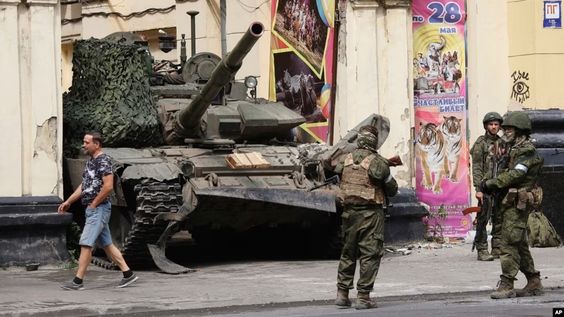World
What is Known About the Wagner Rebellion in Russia

After the Wagner mercenary group’s leader promised to overthrow Moscow’s military leadership, Russian President Vladimir Putin vowed to execute “traitors” from the outfit.
Yevgeny Prigozhin, 62, said in a string of texts that he and his mercenary soldiers had invaded Rostov-on-Don in southern Russia and taken control of its military facilities late on Friday until early on Saturday.
Here is what we currently know:
What caused the uprising?
Prigozhin has been engaged in a power struggle with the military’s senior brass for months, holding them responsible for the deaths of his soldiers in eastern Ukraine.
He has repeatedly charged them with underfunding his personal army and stalling progress with red tape while touting Wagner’s triumphs as his own.
As Prigozhin accused Moscow’s military command of ordering strikes on Wagner’s camps and killing numerous soldiers, his rage seemed to reach a boiling point on Friday.
They needed to be stopped, he declared, and he promised to “go to the end.”
Later, he claimed his troops had shot down a Russian military chopper.
A few hours later, the mercenary group’s head claimed to have military installations in Rostov-on-Don, southern Russia, “under control.”
What response has Moscow given?
Overnight, the Kremlin announced that “measures are being taken” to put an end to the rebellion.
Security has been stepped up in Moscow and a number of other areas, including Rostov and Lipetsk.
Putin encouraged Russia to come together after describing the Wagner mutiny as a “deadly threat” to the nation.
He called the Wagner mercenaries’ actions “treason” and threatened “inevitable punishment.”
The Wagner forces, who are they?
Although it consistently denied involvement, the private army has been active in conflicts in the Middle East and Africa.
Last year, Prigozhin acknowledged starting the organization by enlisting the soldiers from Russian jails in exchange for amnesty.
The mercenary group has been leading Russia’s expensive fights in eastern Ukraine.
It had led the way in the months-long assault on Bakhmut, taking control of the location for Russia at terrible cost.
How this impacts the war in Russia
The uprising represents Putin’s greatest significant threat to date and Russia’s worst security problem since he took office in late 1999.
While Kyiv is waging a counteroffensive to retake land, it would draw attention and resources away from the Ukrainian battlefields.
According to reports, the Ukrainian army was “watching” the conflict between Prigozhin and Putin.
While this was going on, Moscow issued a warning that the army of Kyiv was concentrating its forces “for offensive actions” close to Bakhmut.
World leaders were also aware of the gravity of the mutiny; the presidents of Germany, France, and the United States have all stated that they are closely monitoring the situation.
